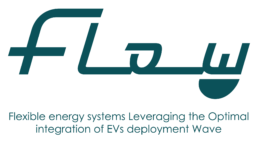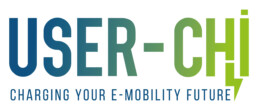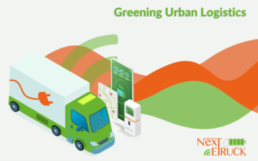EU Election Manifesto: Investment Plan to Implement the Green Deal
Manifesto Second Pillar
An Investment Plan
to Implement the Green Deal

The 2023 Net Zero Industrial Act and the Critical Raw Materials Act needs an accompanying European Net-Zero Infrastructure Investment Plan. A long-term, easy-to-access investment facility – aimed at sectors key to Net Zero – should be a core issue during the European elections.
Freight and logistics infrastructure are a vital component in the movement of goods within Europe. There should be comprehensive investment in developing and deploying sustainable logistics infrastructure. The key elements for decarbonising freight in Europe while remaining competitive are the roll-out of high-power charging infrastructure required for deploying electric trucks of all ranges, the completion of a high quality, interoperable rail network with very high-speed connections, while ensuring a level playing field with other non-emitting modes of transport of goods.
Europe must also improve support for urban transport. Cities are working to accelerate the modal shift and to increase the electrification of their vehicle fleets. To avoid cities becoming the weakest links Europe should be providing parallel support to investments in zero-emission public transport networks and to the deployment of smart and efficient charging infrastructure within urban areas. To support the required local infrastructure investments, the next Connecting Europe Facility (CEF) transport programme should include a dedicated budget for urban nodes, building upon the experience of the Alternative Fuel Infrastructure Facility. Further support from EU research and innovation programmes as well as guidance, will also be needed to overcome challenges such as the constraint of public space, uneven distribution of private investments in EV charging infrastructure in cities or their integration in multimodal hubs, as well as lack of grid capacity.
Net Zero Sectors include the sustainable mining, processing and recycling of critical minerals and metals, modernising power grids and facilities for industrial material recovery as well as renewable energy production. Although existing European funds could contribute significantly, prioritising access to the current EU funding mechanisms and tailoring them to the specific needs of the sustainable transports value chain participants is essential.
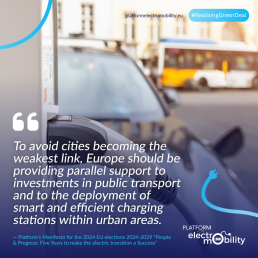
EU Election Manifesto: Introduction
Manifesto introduction
Now is time to
put Green Deal into action

The agreement to pursue zero emissions for Europe’s new cars and vans by 2035 has set a clear direction and an unequivocal target for sustainable transport measures; with the last legislative session providing backing for the European Green Deal. We fully back these efforts, and urge support through enhancements to the existing charging infrastructure, the development of alternatives such as a strong rail network and a sustainable batteries value chain.
However, in order to make the Green transition a reality, and bring its benefits to people, the planet and business, it is vital that we act now. Making the transition to e-mobility must be a priority, not simply to deliver environmental sustainability but also to reinforce the EU’s industrial strength, security and competitiveness.
Now is the time to put the Green Deal into action
The Green Deal, its technologies and fully electric transport modes will significantly reduce Europe’s dependency on fossil fuels. Recent geopolitical events have shown the importance of ensuring energy security and resource independence.
The Green Deal will also make the EU a global leader in the sustainable transport industries. It will position Europe as an authoritative voice on the need for climate change action while bringing welcome economic growth and the creation of high-quality jobs.
The Green Deal will allow Europe to prioritise the quality of life of its current and future workforce. This will see the highest social standards put in place to protect the interests and livelihoods of Europe’s workers, both now and as part of a sustainable future.
An effective green industrial policy will bring the benefits of Europe’s Green Deal to all.
Continuing and rapid decarbonisation is crucial: but it must be done in such a way that preserves Europe’s competitiveness. Nowhere is this more important than in transport and mobility. The Platform for electromobility – an alliance of companies, cities and NGOs – brings the knowledge and expertise to make an effective and efficient mobility transition a reality.
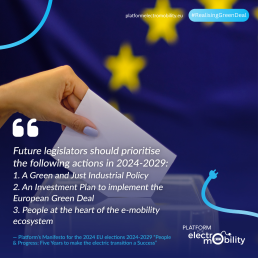
Open letter to German Chancellor Scholz on CO2 Standards for cars and vans
Open letter
Industry and civil society call for certainty, ambition, and respect of co-legislators’ agreement on CO2 standards for cars and vans
Adressed to German Chancellor Olaf Scholz
Dear Chancellor Olaf Scholz,
The recent yet indefinite postponement of the vote on the CO2 Standards for cars and vans within the Council of the European Union has brought concerns to both business and civil society organisations alike.
With this open letter, the Platform for electromobility, uniting both spheres in a 47-member strong alliance to ensure the conditions for the full electrification of new light-duty vehicles by 2035, renews its support to the overall greenhouse gas emissions reduction target of 55% by 2030 and the climate neutrality objective by 2050. Reducing – and ultimately eliminating – emissions from cars, vans and trucks will be key to achieving these objectives.
As validated by the European Parliament in February, the cars and vans CO2 legislation will increase the offer and promote the market uptake of zero-emission vehicles. With an increased market, zero-emissions vehicles will also become more affordable with a continuously reduced total cost of ownership and more choice for consumers and will also help tackle air quality and noise issues, bringing an overall benefit to society.
The EU CO2 standards regulation delivers genuine benefits for transport, ensuring planning and investment certainty, setting clear signals to not only car makers and consumers but also to EV infrastructure providers on the required pace for the transition to zero-emission mobility. However, recent political backpedalling has severely blurred those signals to European industries, investors and infrastructure providers as well as the legal certainty formerly established by the EU’s institutional procedures.
The Platform for electromobility thus urges the Swedish Government, as President of the Council, to first provide clarity and certainty on the agenda and secondly to safeguard the agreement as was already agreed in good faith between the EP and Council. Reneging on this deal not only puts at risk the EU Green Deal’s goal to fully decarbonise road transport by 2050, but undermines the very credibility of the EU’s established democratic norms.
Sincerely yours,
Catalogue of members' projects
Catalogue
Discover Platform members' innovative projects
The electromobility ecosystem is yet to be created between sectors that did not need to cooperate in the traditional mobility system and with fast changing technologies. Click here on the projects that are shaping the mobility of tomorrow.
ESCALATE

ESCALATE brings together a highly diverse and committed consortium focused on escalating zero-emission HDVs and logistic intelligence. The goal? To power the European Union’s net-zero future!
Name
ESCALATE
Location
TBA
The consortium pays special attention to selecting the routes of 5 pilots from / close connection to the TEN-T road network on which charging and refuelling stations are and will be available.
Duration
January 2023 - July 2025
Partners
Ford - POLIS
FEV Europe, FEV France, DLR, MBT, INEGI, RWTH, BMC, VTT, AUTH, ENGIE, CEA, FEV TR, AI4SEC, BRING, BLRD, KEM, VIV, Hydrogen Europe, ERG, PBX, Primafrio, RSTER, TUBITAK, BSA, SISU, VAL, ORTEM, DHL, DIN, TRJ, RHM, Tefken, Coventry University, Surrey University, ELECT, AEM,
Website
TBA
Main questions
ESCALATE project aims to demonstrate high-efficiency powertrains for long-haul applications that will provide a range of 800 km without refueling/recharging and cover at least 500 km average daily operation in real conditions.
Main findings
The project is built on novel concepts around three main innovation areas:
Sponsors
TBA
Working Group
Six thematic Working Groups each chaired by a Platform members
Work programme is delivered through Working Groups. Any member may participate in any working group. Members are free to participate in all, in a party of the Working Groups. Working Group Leader, appointed by unanimity of WG memebrs, coordinate the activities.
WG Infrastructure
The WG will work on designed the best legislative framework for a sustainable, user- and grid-friendly network of public and private charging infrastructure. The main focus will be the implementation of Alternative Fuel Infrastructure Regulation and the Energy Performance of Building Directive. µ
The WG is currently chaired by:

WG Logistics & buses
The main objective of the WG will be to influence the implementation of the CO2 Standards for trucks and buses as voted in 2023. The WG is also expecting to work on the electrification of urban buses, the weight and dimension directive as well as the combined transport directive.
The WG is currently chaired by:

WG Supply Chain
The WG's priorities are enhancing transparency and traceability for Battery Regulation (BR) and Extended Lifecycle Vehicle Regulation (ELVR), identifying recycling enablers, exploring due diligence for regulatory stability, finalizing PFAS recommendations, and promoting circularity and recycling in e-mobility industries.
The WG is currently chaired by:
WG Energy
The WG's priorities include emphasizing energy efficiency through direct electrification to promote e-mobility and EU autonomy, disseminate recommendation for integrating EVs smoothly into the grid. In the future, the WG will focus on REDIII guidance, and notably credit mechanisms for private charging points.
The WG is currently chaired by:
WG Fleet
The Working Group Fleets' priorities include greening corporate fleets through successful public consultations and conferences, proposing policy measures to accelerate fleet electrification using incentives and regulations, and adopting a consumer-centric approach to improve affordability.
The WG is currently chaired by:

WG EU Industrial Strategy
The WG is pushing for a strong European industrial policy. It will react to upcoming political proposal. In addition, the WG is working to propose a solid methodology for Life-Cycle Assessement for electric vehicles.
The WG is currently chaired by:

Reaction Paper to the new Article 12 “Infrastructure for sustainable mobility” (EPBD)
Reaction Paper to the new Article 12 “Infrastructure for sustainable mobility” of the Revision of the Energy Performance of Buildings Directive
Last year, 2021, set a record for the battery electric vehicle (EV) sales, which achieved 10%[1] of total sales in the European automotive market. This trend is expected to continue to rise, driven by the new ambitious objectives set by the EU along with the national recovery plans implemented by Member States. However, the challenge remains immense. Indeed, the number of EVs is set to increase throughout the EU as a result of the proposed ban of internal combustion engines (ICE) sales by 2035, set out in the revision of the Regulation on the CO2 standards for cars and vans as part of the Fit for 55. Consumer demand for electric bicycles is also increasing strongly, with more than 4.5 million units sold in 2020, representing more than 20% of total sales.
If Europe is to succeed in its transition towards zero-emission mobility, the correct charging infrastructure needs to be put in place to push the EV market into achieving the required growth and ensuring a positive customer experience. Here, the deployment of private charging is of the utmost importance for encouraging the growth of electromobility, as 90% of all charging takes place at home or in the workplace. However, the current electromobility provisions of the Directive on the energy performance of buildings (EPBD) will fall significantly short in establishing the right conditions for the widespread adoption of EVs.
The Platform for electromobility therefore fully supports the revision of the EPBD
The Platform for electromobility therefore fully supports the revision of the EPBD presented in December 2021, as it is the main EU legislation for addressing private charging. The introduction of Art. 12 in the Commission’s proposal, which relates to electromobility in buildings, is therefore central to supporting zero-emission mobility in the EU. In particular, the Platform welcomes the:
However, the Platform believes that further improvements are needed, and has therefore set out five recommendations:
Clarify the scope of application of Art. 12.
The way Art. 12 is currently drafted could be interpreted as meaning that requirements only apply to parking spaces if ‘the car park is physically adjacent to the building’ but not if it is ‘located inside the building’. We believe this is not the Commission's intention and therefore ask for further clarification.
Ensure charging solutions in existing buildings.
Some 80% of the EU’s current building stock will still be in use by 2050, with the average annual major renovation rate just 2.7% for non-residential buildings and 1.5% for residential buildings. As a result, the EC should ensure the installation of charging points in existing buildings.
Completing the charging requirements for new and under major renovation buildings.
The Platform asks to complete the charging requirements for new buildings and buildings undergoing renovation in order to mandate the deployment of smart-charging ready recharging points in all new and existing buildings.
Reinforce the deployment of smart charging functionalities
The development of smart charging and bidirectional charging (V2G) in buildings is an opportunity for EV users. It provides a superior charging experience and reduces the consumers’ electricity bill. Indeed, in France, on average with V2G, the annual cost of recharging an electric vehicle is 240€/year, compared to 420€/year without smart charging functionalities. The Commission has recognised, in its AFIR Impact Assessment, that every smart recharging point could on average create a system benefit of more than 100€/year by 2030. Smart charging also reintegrates electricity surpluses into the grids (V2G) and/or reuse it in the buildings (V2B) and homes (V2H), as well as supporting the uptake of electromobility. It can also create synergies with renewable energies, by integrating them into the electricity grids and providing flexibility services to the system. Furthermore, smart charging complements the right-to-plug by ensuring that charging points optimise the use of the grid capacity of a building and removes the argument that grid connections need to be reinforced.
Reinforce the measures to ensure pre-cabling
Pre-cabling of buildings should refer to both the technical cabling (cable path, technical sheaths, drilling) and the electrical pre-equipment in collective electrical installations (switchboard, horizontal electrical column, bus cable).
The comprehensive pre-cabling of buildings will enable the subsequent connection of individual charging points, at minimum cost, by simply installing a home charger. Furthermore, the pre-cabling of renovated buildings is a low hanging fruit, with little cost involved when done during the construction phase – which is the most efficient way to do it. Cabling after construction is completed is not cost-efficient and would lead to highly cumbersome discussions with project developers. Ducting infrastructure is a future-proof and cost-effective solution, the installation cost of which is minimal when compared to the total cost of constructing or renovating a building. By way of comparison, failure to ensure ducting infrastructure would entail costs that could be up to nine times higher if a building needs to be retrofitted.
EPBD: Our support to the proposal
The Platform for electromobility therefore fully supports the revision of the EPBD presented in December 2021, as it is the main EU legislation for addressing private charging. The introduction of Art. 12 in the Commission’s proposal, which relates to electromobility in buildings, is therefore central to supporting zero-emission mobility in the EU. In particular, the Platform welcomes the:
- Guarantee to the right-to-plug in all buildings and the removal of regulatory barriers (Art. 12. 8)
- Obligatory pre-cabling of all new and under-renovation buildings.
- Requirement for smart charging-readiness for all new and renovated chargers, as well as bidirectional chargers (V2G) when appropriate (Art. 12.6)
- Reinforcement of the charging requirements for new and renovated buildings (Art. 12.1, 12.2 and 12.4)
- Lowering of the existing parking space thresholds for pre-cabling and installation of charge points for all new and renovated non-residential buildings (Art. 12.1, 12. 4)
- Requirements for bicycle parking (Art. 12.1 – 12.4)
- Suppression of the unnecessary exemptions, particularly those applied to SMEs in article 8(4).
EPBD: Reinforce the measures to ensure pre-cabling
Pre-cabling of buildings should refer to both the technical cabling (cable path, technical sheaths, drilling) and the electrical pre-equipment in collective electrical installations (switchboard, horizontal electrical column, bus cable).
The comprehensive pre-cabling of buildings will enable the subsequent connection of individual charging points, at minimum cost, by simply installing a home charger. Furthermore, the pre-cabling of renovated buildings is a low hanging fruit, with little cost involved when done during the construction phase – which is the most efficient way to do it. Cabling after construction is completed is not cost-efficient and would lead to highly cumbersome discussions with project developers. Ducting infrastructure is a future-proof and cost-effective solution, the installation cost of which is minimal when compared to the total cost of constructing or renovating a building. By way of comparison, failure to ensure ducting infrastructure would entail costs that could be up to nine times higher if a building needs to be retrofitted.
Key recommendations:
- Introduce an explicit definition of pre-cabling, in order to encompass the electrical installation; it should not be limited to ducting infrastructure. To secure efficiency, electrical installations should be considered as ‘technical building system’ (Art. 2.6).
- Inform on the readiness of any building to safely install an EV charging point into the Energy Performance Certificates (Annex V).
- Integrate Energy Performance Certificates information about the status (safety and readiness) of electrical installations (Annex V)
- Set up local or regional one-stop-shop accessible websites and portals that combine various services, including the right to request with streamlined permits and installation procedures.
- Ensure that requests for installing charging stations in collective properties do not exceed three months. (reinforce ‘right to plug’).
- Address the administrative hurdles (for example, EV charging as extra-legal benefit for employees) as well as collective action problems (such as split incentives between EV and non-EV drivers, renters vs. owners, employee vs. employer, etc.).
- Encourage Member States to financially support the installation of EV charging in buildings (including depots and logistic hubs for trucks, light-duty vehicles and buses). The Commission and its co-legislators, including the Member States, should also examine the possibilities of using new and current financial instruments to stimulate investment in private charging infrastructure.



